New York State Greenlights Self-Driving Cars

CARS.COM — New York state has officially signed off on permitting self-driving cars on public roads, though your next taxi ride amongst the madness of Manhattan rush-hour will remain human-powered, at least for the foreseeable future.
Related: Tech News: Automakers Accelerate the March Toward Self-Drive
The announcement, first reported by Automotive News, carries a couple of strange caveats that could limit the appeal of using the Empire State as a test bed for autonomous vehicles. One of the major obstacles appears to be the rule that any self-driving car or truck must be officially escorted by a New York state police officer. Other states with active self-drive programs on their roadways, such as California and Arizona, do not present the same logistical hurdle.
Why Should I Care? Automakers and technology companies aren’t the only ones eager to move into the field of self-driving cars. States are also looking to cash in on this projected multibillion-dollar industry as it takes shape. Luring corporate giants in the automotive and tech worlds could be a windfall for U.S. states, which are eager to boost everything from their tax base to the potential marketing image as being an incubator for innovation.
While New York represents another step forward in terms of the essential real-world testing of autonomous cars, a few curious rules could hinder its overall appeal. For starters, there’s that major issue that any firm testing a self-driving car will also have to pay the New York state police to provide an escort during any public trials. The organization of this — not to mention the unknown price-tag that comes with it — could be a serious deterrent.
In fact, Waymo, the self-drive research unit of Google parent company Alphabet, recently announced a pilot program in the Phoenix metropolitan area that allows the public to experience (mostly) human-free vehicles first-hand — a driver is behind the wheel at all times should human intervention be required. After applying to be a part of the program online, approved applicants will be shuttled around town in a Chrysler Pacifica Hybrid minivan outfitted with Waymo’s autonomous drive system. Users are encouraged to use the service frequently for regular errands and chores. While it’s annoying that Waymo has final say as to who is allowed into the program, a police motorcade is not mentioned in any of the fine print.
New York’s self-driving vehicle tests can also be done only in limited areas and especially not around active construction sites. This makes testing anywhere in New York City, possibly one of the biggest urban challenges facing self-driving car engineers, pretty much a no-go right from the get-go.
Waymo Partners With Lyft in Battle for Ride-Hailing Supremacy
The details remain murky, but the underlying message is clear: Uber, you’d better keep an eye on your rearview mirror. Waymo has revealed it’s collaborating with Lyft, the perennial runner-up to Uber in the lucrative ride-hailing arena. As reported by The New York Times, the deal is major news in the world of self-drive vehicles, though actual specifics about the burgeoning partnership remain in short supply.
What is most likely is a form of cross-channel cooperation in which Lyft uses vehicles outfitted by Waymo with its latest self-drive sensors and software. Then, like other autonomous drive pilot programs, the vehicles will be used in a limited setting, with an engineer onboard to make certain nothing goes wrong if the car becomes confused during a drive.
The potential four-wheeled test subject, so to speak, will probably be Chevrolet’s Bolt EV electric car. Lyft and Chevy are already in a partnership to test Bolt EVs outfitted with self-drive sensor arrays. However, GM’s recent purchase of Cruise Automation, a startup specializing in self-driving vehicles, could present a quandary as to which cars are used, and whose sensor arrays and software are fitted.
Why Should I Care? We’re going to need a chart to keep track of every new partnership between car companies and tech firms. GM buys Cruise Automation and invests heavily into Lyft, which agrees to help develop self-drive Bolt EVs. Now along comes Waymo, which, as part of the Google tech empire, has been working on autonomous drive solutions longer than pretty much any other player. Waymo is also actively operating a fleet of self-driving vehicles that include Lexus SUVs and hundreds of Chrysler Pacifica minivans.
This latest maneuver could be partly down to Waymo’s increasingly bitter rivalry with Uber, the undisputed ride-hailing king in the U.S. market. Uber is locked in a court battle with Waymo over whether a former Google engineer, Anthony Levandowski, absconded with engineering secrets before leaving to found his own self-drive company, Otto. Mere months later, Uber bought Otto for more than $600 million, and Levandowski took a lead role in Uber’s self-driving research division.
Waymo argues that Uber is now profiting from stolen sensor technology and, in the short term, has asked a judge to put a hold on Uber’s research until the matter can be definitively settled. Such a move could potentially set Uber far behind rival firms — such as Waymo and Lyft, for example — in the race to make self-driving vehicles an everyday reality.
Featured stories




